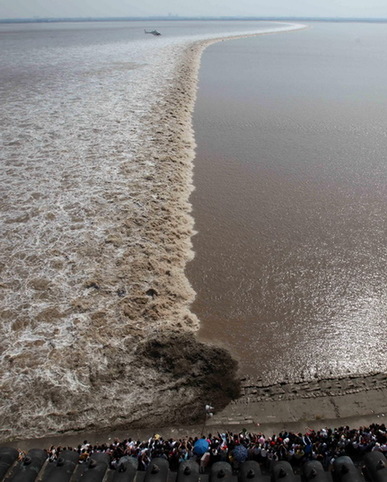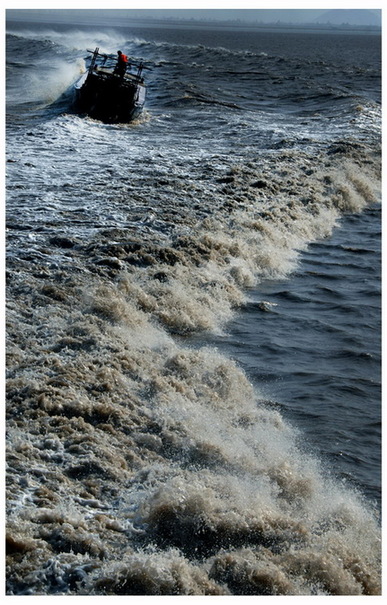Watching tidal bore at Qiantang River
By Wang Ye (chinadaily.com.cn) Updated: 2015-07-20 16:25

If you plan to travel to Zhejiang province, a prosperous land in Southeastern China, the picturesque West Lake should be on top of your list along with the tidal bore at the Qiantang River.
The tidal bore in the Qiantang, also known as Haining tidal bore, which sees large waves created by the gravitational pull of the moon and the sun and the centrifugal force produced by the rotation of the earth, and by the peculiar 'trumpet-shaped' mouth of Hangzhou Bay, is believed to be one of the three biggest tides in the world and favored by visitors from generation to generation.
It’s the rainy season and I come to It was the monsoon season when I went to Yanguan town in Haining city, one of the 15 ancient towns in Zhejiang province, traditionally the best place to watch Qiantang River Tide. The best time to watch the natural wonder usually falls on the eighth day of the eighth month in the Chinese lunar calendar. Although it was not the best time to watch the nature’s wonder when arrived there, tens of thousands of visitors were jostling with each other here to catch a glimpse of the world-famous annual event.
By 10:40, the crowd suddenly roared in a flood of cry. Mighty waves like silver ribbons surged from the horizon and the soaring tidal bores blasted a gigantic wave over the bank, which sounded like thunder, or thousands of horses running.

As the Hangzhou Bay is wider at its mouth and narrower at its body, the soaring waves from the Pacific Ocean beats their way more fiercely here., Called ‘yi xian chao’, literally ‘a ribbon of tide’ in Chinese, it one of the three gigantic tides in Qian tang River, the other two being ‘jiao cha chao’, ‘the crisscrossing tide’ at the Great Gap and ‘hui tou chao’, ‘the whipping-around tide’ at lao yan cang, the Ancient Salt Storehouse. Visitors are mesmerized by the soaring tidal bores that sound like tens of thousands of soldiers charging.
I stand some meters away from the bank, yet the surging waves still splash water over my face. I shudder at the enormity of the soaring tidal bores and back several steps. Local friends advise me to watch ‘the whipping-around tide’ at lao yan cang, yet I shake my head, not knowing whether out of reverence or not.











